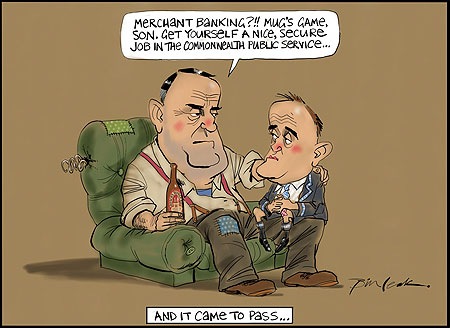Search
Democracy Links
Member's Off-site Blogs
a mug's game .....

from Crikey …..
CBA rips off customers whilst devouring rivals
Crikey founder Stephen Mayne writes:
So, the Commonwealth Bank can afford to shell out $2.1 billion buying BankWest and boast about carrying "substantial surplus capital", but the nation’s biggest home lender can’t pass on the full 100 basis point cut in official interest rates.
Whilst it is true that Australia’s $900 billion home loan market relies on about $200 billion from the offshore securitisation markets, the Commonwealth Bank is in the best position of all given it dominates the deposits market.
Indeed, many billions have flooded into the CBA over recent months due to this "flight to quality". After BankWest is swallowed, it will have 33.6% of the deposits market and 22.5% of the home loan market.
When Wayne Swan defends the CBA for not passing on interest rate cuts, he should remember that federal taxpayers sold 100% of the bank in three tranches between 1991 and 1996 for an average of about $8 a share, raising $8 billion in total.
Now the bank is doing its biggest ever cash equity raising to generate $2 billion through a selective placement of shares to institutions which will probably be priced at about $40 a share. Throw in almost $25 in fully franked dividend payments since 1992 and investors have enjoyed profits of more than 1000%, all of which has come from leading the charge to deliver the world’s most expensive banking system for long suffering Australian consumers.
Whilst the Big Four should be allowed to mop up weaker competitors or departing foreign players during these unprecedented times, the regulators should return with vigour once the dust has settled.
Countries such as Germany and Switzerland are not enjoying the experience of having dominant players such as Deutsche Bank and UBS which are too big to fail, given gross assets are close to national GDP.
Banks are meant to facilitate financial transactions as a clearing house that links lenders and borrowers. Clearly, the global industry lost a bit of focus on this core utility-like role during the great credit bubble.
After the Great Depression, the US introduced that Glass-Steagall Act which, amongst other things, banned banks from investing in other financial companies to try and control speculation and keep them focused on the main game.
Bill Clinton repealed it in 1999 in one of the great regulatory follies of our time.
The financial conglomerates that emerged blew up the global system in their greed, creating a stack of institutions that were too complicated to regulate and too big to fail, as chaos unleashed by Lehman Brothers demonstrated.
Westpac and the Commonwealth Bank have become dangerously large, so maybe the government should explore a "back to basics" approach.
Australia already has the world’s most concentrated financial system where the Big Four banks also control a majority of the funds management industry. Indeed, the HBOS St Andrews wealth management business will lift CBA’s funds under management to $187 billion.
The Rudd Government could do worse than introducing a version of Glass-Steagall Down Under that forced banks out of the funds management business given the obvious conflicts between allocating debt and equity in an economy.*Listen to the wonderful harp in the background during this hard-hitting credit crunch discussion with Michael Smith on 4BC last night.
- By John Richardson at 8 Oct 2008 - 10:22pm
- John Richardson's blog
- Login or register to post comments
Recent comments
7 hours 33 min ago
11 hours 53 min ago
17 hours 14 min ago
19 hours 8 min ago
20 hours 37 min ago
22 hours 31 min ago
23 hours 19 min ago
1 day 14 hours ago
1 day 14 hours ago
1 day 15 hours ago